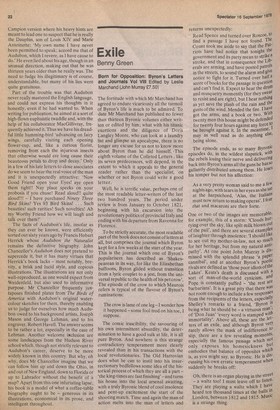Exile
Benny Green
Born for Opposition: Byron's Letters and Journals Vol VIII Edited by Leslie Marchand (John Murray £7.50) The fortitude with which Mr Marchand has agreed to endure vicariously all the turmoil of Byron's life is much to be admired. To date Mr Marchand has published no fewer than thirteen Byronic volumes either written or edited by him; what with his titanic exertions and the diligence of Doris Langley Moore, who can look at a laundry list and glimpse an apocalypse, there is no longer any excuse for us not to know more about Byron than he did himself. 'This eighth volume of the Colleted Letters, like its seven predecessors, will depend, in the extent to which it appeals to the general reader rather than the specialist, on whether or not Byron could write a good letter.
Well, he is terrific value, perhaps one of the most readable letter-writers of the last two hundred years. The period under review is from January to October 1821, beginning with his excursion into the revolutionary politics of provincial Italy and ending with his departure from Ravenna for Florence.
To be strictly accurate, the most readable part of the book does not consist of letters at .all, but comprises the journal which Byron kept for a few weeks at the start of the year. This is the journal which one of Byron's popularisers has described as 'Shakespearean in its way, for like the Elizabethan buffoons, Byron glided without transition from a lyric couplet to a jest, from the universal republic to the health of his pet crow', • The episode of the crow to which Maurois refers is typical of the flavour of Byron's ruminations: The crow is lame of one leg — I wonder how it happened —some fool trod on his toe, I suppose.
The comic irascibility, the savouring of his own intermittent absurdity, the determination to have a good sulk at life, it is all pure Byron. And nowhere is this strange contradictory temperament more clearly revealed than in his transactions with the local revolutionaries. The Old Harrovian does what he can to instil into his insurrectionary bedfellows some idea of the historical process of which they are all a part — 'the king-times are fast finishing' — and turns his house into the local arsenal awaiting, with a truly Byronic blend of cool insolence and pent-up excitement the start of the shooting match. Time and again the man of action melts into the man of letters and returns unexpectedly: Read Spence and turned over Roscoe, to find a passage I have not found. The Count took me aside to say that the Patriots have had notice that tonight the government and its party mean to strike a stroke, and that in consequence the Liberals are arming, and have posted patrols in the streets, to sound the alarm and give notice to fight for it. Turned over half 3 score of books for the passage in question and can't find it. Expect to hear the drum and musquetry momently (for they swear to resist and are right), but I hear nothing as yet save the plash of the rain and the gusts of the wind. Mended the fire. I have got the arms, and a book or two. With twenty men this house might be defended for twenty four hours against any force to be brought against it. In the meantime, I may as well read as do anything else' being alone.
The episode ends, as so many Byronic episodes do, in the wildest slapstick, with the rebels losing their nerve and delivering back into Byron's arms all the guns be has sal gallantly distributed among them. He loses his temper but not his affection: As a very pretty woman said to me a few nights ago, with tears in her eyes as she sat at the harpsichord, 'Alas, the Italians must now return to making operas'. I fear that and macaroni are their forte.
One or two of the images are memorable' for example, this of a storm: 'Clouds hurrying over the sky, like spilt milk blown out of the pail', and there are several examPles of laughter through insolence: should like to see out my mother-in-law, not so much for her heritage, but from my natural ante pathy% At one point John Murray is d15 missed with the splendid phrase 'a paPer cannibal', and at another Byron's poetic rivals are defined as 'those poor idiots of the Lakes'. Keats's death is discussed with a sort of man-of-the-world cynicism, and Pope is constantly puffed — 'the rest are barbarians'. It is a great pity that there was not room enough to include a few responses from the recipients of the letters, especially Shelley's remarks to a friend, 'Byron 1,s being what he should be — a virtuous man,' of 'Don Juan' word is stamped with immortality'. Above all, these are the letters of an exile, and although Byron verY rarely allows the mask of indifference t° slip, there are a few revealing moments, especially the famous passage which not only exposes his homesickness but embodies that balance of opposites which is, as you might say, so Byronic. He is discussing his own erratic temperament when suddenly he breaks off: Oh, there is an organ playing in the street — a waltz too! I must leave off to listen. They are playing a waltz which I hav,e heard ten thousand times at the balls m London, between 1812 and 1815. Music is a strange thing.


































 Previous page
Previous page